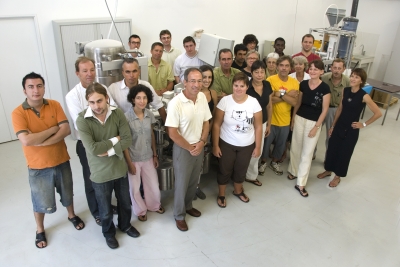
Food, Global Health Reading time 4 min
Joël Abécassis, innovation in cereals
Published on 17 September 2009
From technical and molecular knowledge of cereals to artificial intelligence
"If grains of wheat had no furrows, no millers would exist," says Joël Abécassis, whose career began when he started studying to become a milling engineer. Unlike rice bran, which can be removed by polishing, wheat bran requires a much more skilled approach. Milling involves a series of operations: crushing, sieving, and sifting, to separate the fibre-rich husk from the starchy, protein-rich endosperm, which is turned into flour. At least, that's what traditional milling is like. "Right now," – and it is an area of research for Joël Abécassis' team – "we are no longer satisfied with just this, and we're trying to separate the different parts of the grain more precisely to make full use of their properties. We're gradually leading up to a dry refining process for plants." One of his innovative programmes consisted of developing a fractionation process for the micronutrient-rich aleurone layer. From there, finding a way to separate different components doesn't sound so farfetched: proteins, starch, lipids to be used in oils, and fibres that can be converted to biofuels. "We must go beyond the food or fuel debate;" he says. "The future lies in breeding varieties that lend themselves well to fractionation."
Abécassis is behind the collective analysis being conducted by INRA's cereals specialists, composed of some ten researchers who hail from fields as diverse as molecular biology and economics. The group studies how the cereal sector works and its driving forces. "Our conclusions have just been published, and we now want to share them with industry players to pave the way for new research programmes." The cereals sector is made up of highly complex systems with many stakeholders who do not always share the same views. The quality of the products made by the industry also depends on several criteria. Faced with stakes that are sometimes at odds with each other, and to aid the decision-making process, Abécassis has, in his team, promoted an approach using artificial intelligence. With the help of programmers, he designs software that integrates and represents acquired knowledge, then elaborates reasoning and decision-making processes, presented in the form of risk-benefit assessments.
The innovator of our plates
Joël Abécassis began his INRA career studying hard wheat. Pasta production holds no more secrets for him! Anticipating the question, he explains how to make holes in macaroni. Water is added to semolina and mixed, then forced through a cylindrical mold on either side of a die, where the pasta is split in two then fused back together with the hole in the middle. Abécassis took part in developing a pasta drying process that keeps the noodles from sticking together during cooking. In the process, high-temperature peaks are included in the drying cycle. It has the added advantage of cutting drying time for spaghetti to under two hours, from an initial seventeen!
With his mastery of hydrothermal processing techniques, Joël Abécassis is behind Ebly® wheat, a dry wheat that cooks in ten minutes and a staple in several European countries. The originality of the process lies in the combination of an initial pre-cooking stage for the grains in order to convert some of their starches, and a final expansion stage that includes a very brief high-temperature processing time, which gives the pre-cooked grains a tightly-meshed porous structure that allows the product to rehydrate very rapidly.
A major contribution to the progress of the cereals sector
Abécassis achieved this result with his command of the experimental platform for hard wheat processing, which he set up in 1972 when he joined INRA-Montpellier. His work has also helped breeders improve French hard wheat varieties, by establishing easily-measured quality criteria: suitability for semolina production, viscoelastic properties, protein content and composition, and product colour. France used to import hard wheat in the 1970s. Thanks to advances in breeding, it now exports two-thirds of its wheat production.
Throughout his creative career, Joël Abécassis has appreciated the freedom that INRA gives him to try new things. It has allowed him to develop many aspects of his work, from molecular studies to manufacturing prototypes, knowledge capitalisation to artificial intelligence, partnerships to decision support. He is a member of the executive committee of the International Association for Cereal Science and Technology (ICC) and heads the scientific board of Arvalis-Institut du végétal.
Joël Abécassis has made a major contribution to cereal technology, but when he's not working on grindstones, he spends his free time piling real stones to restore walls and Provençal stone huts known as "bories", as part of an association.

